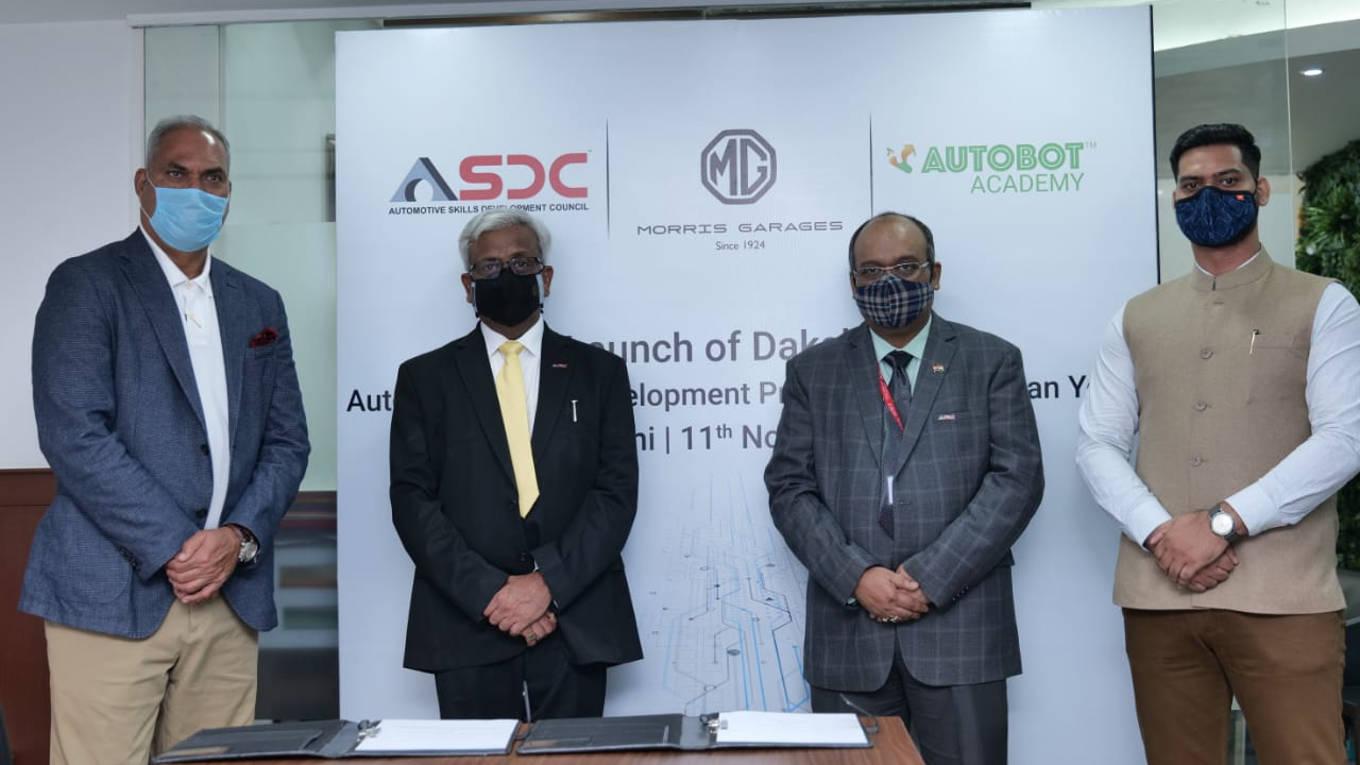-

MG's Yash Yadav, ASDC's Nikunj Sanghi and Arindam Lahiri and Autobot's Ashwini Tiwari at the launch ceremony
MG Motor India recently signed a Memorandum of Understanding (MoU) with Automotive Skill Development Council (ASDC) and Autobot India to extend its global tech prowess and expertise to students. The partnership is a step towards democratizing high-end car technologies in the country through online and offline skill development courses for engineering students.
Reinforcing its commitment to creating an ecosystem of innovation in the country, the carmaker has introduced an Automotive Skill Development programme for Indian youths known as ‘Dakshata’ (synonym for efficiency) in partnership with ASDC and Autobot India. The move comes as part of MG’s vision of CASE (Connected, Autonomous, Shared, and Electric) mobility which the automaker has augmented in its product portfolio in India.
As part of the Skill India Mission, Dakshata will comprise an eight-module training programme specialising in artificial intelligence and electric vehicles. It will focus on skill enhancement thereby improving employability in the automotive sector while creating skilled manpower to cater to the automotive industry’s future requirements. The Dakshata project will initially focus on online learning during COVID times and will later involve case studies and best practice sharing.
“MG’s primary objective since its inception in India has been to bring the latest in advanced technologies and foster a spirit of innovation among young visionaries to pursue their dreams. The Dakshata programme is one such initiative that will enable young students develop relevant skills on futuristic technologies and become self-reliant, thereby empowering them for a brighter future and further strengthen the goal of fulfilling a broader vision of Skill India”, said Yash Yadav, Chief Corporate Affairs Officer, MG Motor India on the initiative.
-
As part of the Skill India Mission, Dakshata will comprise an eight-module training programme specialising in artificial intelligence and electric vehicles
“We thank MG Motor for collaborating with us for the Dakshata programme, which is part of our shared vision of building a sustainable skilling ecosystem in the automotive industry. With evolving customer needs, existing skills will require a lot of re-calibration and Dakshata is such an avenue for providing specialised training, apprenticeship opportunities, and quality facilities to make the workforce industry-ready. We are constantly working towards enhancing our skill development initiatives keeping in pace with the rapidly changing technology trends and emerging industry needs. ASDC assessment and certification will help in boosting the competency and competitiveness of the industry stakeholders”, added Nikunj Sanghi, Chairman, ASDC.
“With the current technology disruption in the automotive sector, new-age vehicles need to be more technologically advanced, connected, and smart. This calls for an entirely new set of skills and knowledge to drive the industry growth and its complete value-chain, helping develop the in-house capability”, explains Ashwini Tiwary, Founder and CEO, Autobot India.
As the technology-cost curve is becoming steeper, more technologies are finding their way into the automotive sector at present. Be it hybrid technology, or electric vehicles, the automotive industry is evolving at a rapid pace. The programme’s goal is to train ITI and diploma students as well as engineering students to fill the supply deficit of the skilled automotive workforce. ASDC is a joint initiative of the government of India, Society of Indian Automobile Manufacturers (SIAM), Automotive Component Manufacturers Association (ACMA), and Federation of Automobile Dealers Association (FADA).
Biogas
BioEnergy will showcase its innovative biogas technology in India
Mobility
Ather aims to produce 20,000 units every month, soon
Green Hydrogen
German Development Agency, GIZ is working on a roadmap for a green hydrogen cluster in Kochi
Renewable Energy
AGEL set to play a big role in India’s carbon neutrality target



















